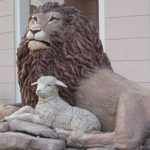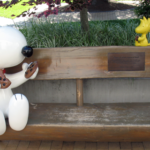“It is like this disease is going to slowly strip me of everything but my soul,” my 61-year-old mother told me days after being diagnosed with amyotrophic lateral sclerosis, also known as ALS or Lou Gehrig’s disease, in August 2007. She received a death sentence. The neuromuscular disease takes its victims prisoner, progressively denying them the ability to walk, eat and talk before refusing to allow them to breathe. Most die within three to five years.
I stared at my mom, not knowing what to say. I still remember sitting in a lecture hall during my first year of medical school, learning about this illness. It takes away a person’s independence but hideously leaves the brain and all mental functions completely intact.
I knew this diagnosis was coming for several months. Mom waited for doctors’ appointments, unhurried, as she seemed to know what the diagnosis would be. We began talking about the possibilities when her footdrop started 18 months earlier. We quickly dismissed ALS as something that only happens to other people. I slowly began to recognize the truth. But she optimistically kept thinking her problem must be something else.
My visit with Mom seemed surreal that day. Then, she suffered only a footdrop, which required a brace and cane, and her articulation was imprecise. My mind jumped ahead—another brace, walker, wheelchair, feeding tube, hospice? “Not my mom,” I thought.
“I will be with you. I will not fail you or forsake you” (Joshua 1:5). God provided words of comfort. I felt thankful for the reassurance of God’s presence. My aching heart leaned on the promise that the God who led the Israelites into unknown territory thousands of years ago is the same God now carrying us in the palm of his hand.
“Even though I walk through the valley of the shadow of death, I will fear no evil for you are with me” (Psalm 23:4). King David’s famous psalm suddenly encompassed personal dimensions. It calmed my soul as I walked through uncharted valleys, and God used this passage just when I needed it most.
I didn’t understand why we were going through this, but I knew “the Spirit himself intercedes for us with groanings too deep for words” (Romans 8:26) when we don’t know how to pray. God cradles us in his hands. I knew it then more than ever. Mom was not dead, and yet I grieved as if she were. I grieved for myself, for my dad, for our family and for her. “Groanings” were the only thoughts appropriate at that time.
Mom shared many thoughts that day: “Will the grandkids remember me? … I want to watch them grow up. … I wish your dad didn’t have to go through this. … I wish for a moment we could go back in time before this diagnosis so I could see the twinkle in your eyes with a genuine smile,” she told me as she winked, trying to smile herself, just for me.
All of us seemed in a cloud—wanting to fix things and yet helpless. I wondered: “What is the right way to face this challenge? How do we deal with this in the best way for Mom and for each other? What is the bigger picture here? Why is this happening? If God is all powerful, and I believe he is, why did he allow this?” I could only come up with one answer—in some way, God must be glorified in this. I could not understand it, but I believed somehow, some way this experience must draw us and others closer to God.
Sign up for our weekly edition and get all our headlines in your inbox on Thursdays
“God causes all things to work together for good to those who love God, to those who are called according to his purpose” (Romans 8:28). I determined to honor God with my thoughts, time, words and actions so that in the midst of this crisis, others would see unwavering faith in Almighty God. I did not feel strong enough to do this, but I knew I must try. If we must travel this road with Mom, I did not want the experience to be wasted. If our own pain could somehow bring others closer to God, I wanted this to happen.
Time marched; my heart continued to ache. We tried to do “normal” things. Another grandkid’s birthday party. Another leg brace. Another holiday celebration. Another fall on the cement getting out of the car. A new walker. Another sunset while we watch the kids play. Although we all, including Mom, tried to pretend, nothing was normal. Her speech became more laborious and imprecise. Her voice, once trained to sing well, quivered, and her lung capacity decreased. We sat at meals to enjoy family fellowship, only to have these treasured times interrupted by a protracted fit of choking and gasping for air as her airways spasmed to prevent aspiration of food. Misery. Yet Mom managed most of her difficulties gracefully.
“My grace is sufficient for you, for power is perfected in weakness” (2 Corinthians 12:9). As with so much of life, I realized this experience was a marathon and not a sprint. I wished it were a relay in which I could pass the baton to someone else. I told myself this was our “new normal.” I learned God does not provide grace in one lump sum to last for two or three years. But just as God gave manna daily to the Israelites in the wilderness, he sustained me with his grace for each moment. When I thought I wouldn’t be able to bear the next step, I discovered “with God all things are possible” (Matthew 19:26).
My spunky, church-organ-playing, “hostess-with-the-mostest” mom (as Dad lovingly labeled her years ago) eventually required a motorized wheelchair and a feeding tube. She barely could be understood, if at all. The grandkids liked the “rides” in the wheelchair and climbed up and down, giggling and laughing. Mom thrived on the attention. The grandkids became her air. She laughed as a little one pretended to feed himself through a tube. The kids gathered around her lap to try out her “voice box,” an electronic device with a keyboard that spoke the words she typed. We tried the voices and gave her English and Australian accents. We laughed and made small talk, but deep down, we all just felt it really stunk. We tried to keep an eternal perspective, but living in the human world can make it hard to think past the next day.
Outings became a challenge. The summer heat of 2009 was “suffocating,” just as Mom’s breathing became laborious. She seldom went to church because it required too much energy. So, my boys and I stayed with her one Sunday while Dad attended Sunday school. In the cool morning air, we went outside. Mom loved watching the boys giggle, run, hide and laugh. I tried to imprint the moment in my mind, realizing I would treasure it later—seeing Mom smile, knowing she was listening as I talked. As we sat there, I wished I could be at church to hear a message from God. I completed that thought as my 3-year-old started singing, “Jesus loves me” as he danced around the yard. Sitting outside in the cool morning air, listening to the birds, enjoying Mom’s company, and hearing a sweet version of “Jesus Loves Me” was better than being in any church sanctuary. God provided “daily bread” once again.
“Cease striving and know that I am God” (Psalm 46:10). In the days surrounding Mom’s death, God’s presence remained apparent, not only spiritually, but tangibly, too—rain on the day of her passing after a long dry spell, cookies made by someone who did not know I just asked God for them, a visit from a long-distance family member who had no knowledge of her passing, and many other events. Only God, our Master, Creator and Savior, could orchestrate this. In the midst of sadness and turmoil, God proved faithful.
“The Lord’s lovingkindnesses indeed never cease, for his compassions never fail. They are new every morning; great is thy faithfulness” (Lamentations 3:22-23). “‘For the mountains may be removed and the hills may shake (and Mom may get ALS), but my lovingkindness will not be removed from you, and my covenant of peace will not be shaken,’ says the Lord who has compassion on you” (Isaiah 54:10).
We never will have the answers to all our “why” questions. We still will feel sad when we think about Mom, even though we know she is running the golden streets of heaven. We will think selfishly about what it would be like to have her here with us in this imperfect world. But we never will question the fact we are held in the hands of a loving God who weaves the tapestry of his kingdom across time and space. He longs to draw all people closer to him. If somehow this scary thing called ALS has had a part in that, my heart will be glad and weep at the same time. I have become comfortable with this mixture of emotions that will likely continue for the rest of my time on this side of heaven, and I am at peace with that.
“For now we see in a mirror dimly, but then face to face; now I know in part, but then I shall know fully just as I also have been fully known. But now abide faith, hope, love, these three; but the greatest of these is love” (1 Corinthians 13:12-13).
So I will do my best to pass the “baton” of God’s word and teach my children to love it and tattoo it on their hearts as they run this marathon called life. They face challenges I cannot fathom. But God already knows what they need. I just have to plant the seed.
“So shall my word be which goes forth from my mouth; it shall not return to me empty, without accomplishing what I desire, and without succeeding in the matter for which I sent it” (Isaiah 55:11).
Although this disease may have stripped Mom of everything but her soul, I know she is victorious in heaven. And I think she is proud to know she was faithful in passing the baton to my brother and me. Once again, God’s promises stand true as his word has succeeded in the matter for which he sent it. “Give us this day … .”
Tresa Muir McNeal is a physician and member of First Baptist Church in Temple. Her mother, Sherry Muir, went to heaven a year ago.














We seek to connect God’s story and God’s people around the world. To learn more about God’s story, click here.
Send comments and feedback to Eric Black, our editor. For comments to be published, please specify “letter to the editor.” Maximum length for publication is 300 words.